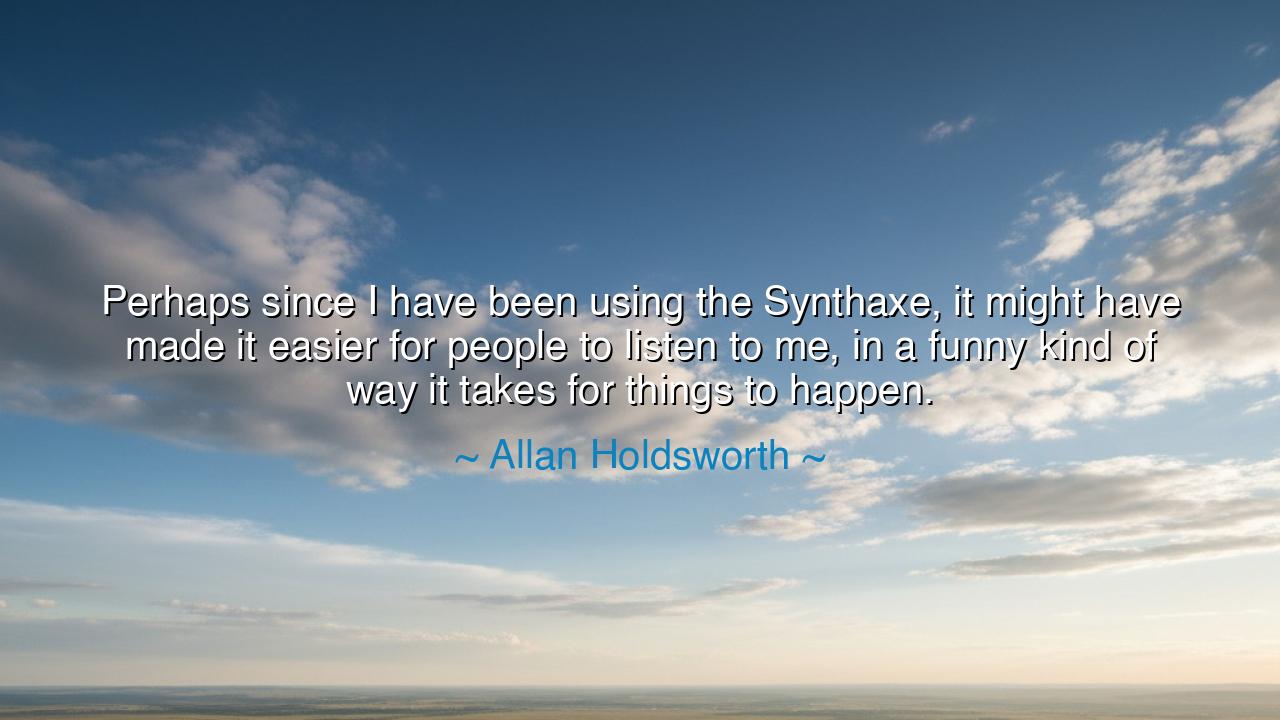
Perhaps since I have been using the Synthaxe, it might have made
Perhaps since I have been using the Synthaxe, it might have made it easier for people to listen to me, in a funny kind of way it takes for things to happen.






The words, “Perhaps since I have been using the Synthaxe, it might have made it easier for people to listen to me, in a funny kind of way it takes for things to happen,” were spoken by the legendary guitarist Allan Holdsworth, a man whose artistry transcended the boundaries of ordinary sound. In this humble reflection, Holdsworth reveals both the struggle and the mystery of the creative journey. His words speak not merely of music, but of acceptance, innovation, and the strange, winding path through which true genius is finally understood. Beneath their simplicity lies a deep truth: that the world often takes time to listen—to catch up to those who are ahead of their age—and that sometimes, it is the tools of transformation that open ears where hearts once slept.
Holdsworth, known for his ethereal tone and breathtaking technique, lived much of his life as a prophet unheard. His mastery of the guitar was unmatched, but his music—complex, fluid, and harmonically daring—was far beyond what most listeners could comprehend. Then came the Synthaxe, a futuristic instrument that blended the worlds of guitar and synthesizer. It allowed Holdsworth to shape sound as a sculptor shapes clay, to give form to what had lived only in imagination. It was through this instrument, this bridge between what was known and what was possible, that people began to truly hear him. His quote reflects that bittersweet realization—that sometimes, it is not the change in the artist, but the change in perception, that awakens recognition.
To the ancients, this truth would have been clear: visionaries are rarely understood in their own time. Socrates drank hemlock for challenging convention; Galileo was condemned for daring to see the heavens differently; Van Gogh painted worlds of color that only shone in the eyes of generations unborn. So too did Holdsworth labor in solitude, his music a temple few entered, until the world found a new door—the Synthaxe—through which they could approach him. His words remind us that understanding often requires not only time, but transformation: the birth of a new language, a new tool, a new way of hearing.
Yet there is humility in Holdsworth’s tone—a soft wonder at how things unfold. He does not boast that he invented something revolutionary; instead, he marvels that fate itself works in strange rhythms, that sometimes recognition arrives not through intention but through coincidence. He acknowledges that even the greatest truths and talents must wait for the right moment, the right vessel, the right season. “In a funny kind of way,” he says—an understatement that hides the long ache of waiting, the years of being unseen. Every artist, every dreamer, knows this feeling: the quiet hope that one day, their work will find its listener, their voice will find its echo.
There is a deeper lesson here for all who create. The world may not immediately understand your vision. It may resist what is new, mock what is different, and dismiss what it cannot name. Yet your task is not to conform, but to persist. Like Holdsworth, you must trust that your art, your truth, will find its way—perhaps not in the way you expect, but in the way the universe allows. Whether it comes through a new tool, a chance encounter, or the slow erosion of misunderstanding, the moment of recognition will arrive. Patience is the companion of innovation.
We might recall the story of Nikola Tesla, whose inventions were so advanced that few could grasp them. He, too, lived in the tension between genius and obscurity. His ideas about wireless energy, alternating current, and the boundless power of the earth seemed like madness in his day. Yet, as time passed and technology evolved, the world began to see the light he had long carried. In Holdsworth’s words, one hears a similar echo—a man too far ahead of his audience, whose work required new instruments, new minds, and new ages to be understood.
So, my child, take this teaching to heart: do not lose faith if the world does not yet listen to your song. The time it takes for understanding to come is the time it takes for beauty to ripen. If your truth is pure, it will endure; if your vision is honest, it will find its place. Like Holdsworth, keep creating, keep exploring, keep speaking in your own voice, even if the world seems deaf. For one day, through a “funny kind of way,” something—an invention, a generation, a single heart—will awaken to your sound, and when it does, it will recognize the beauty that was always there.
In the end, Allan Holdsworth’s words are both a lament and a benediction. They remind us that progress is slow, that genius is often lonely, but that truth—whether in sound, in art, or in life—cannot remain unheard forever. What is real will always find its resonance. So continue to speak, to build, to dream. For though the world may not yet be ready for your music, it will be—and when it comes back, it will come back up like a symphony of understanding, fierce and full, in the time that it was always meant to arrive.






AAdministratorAdministrator
Welcome, honored guests. Please leave a comment, we will respond soon